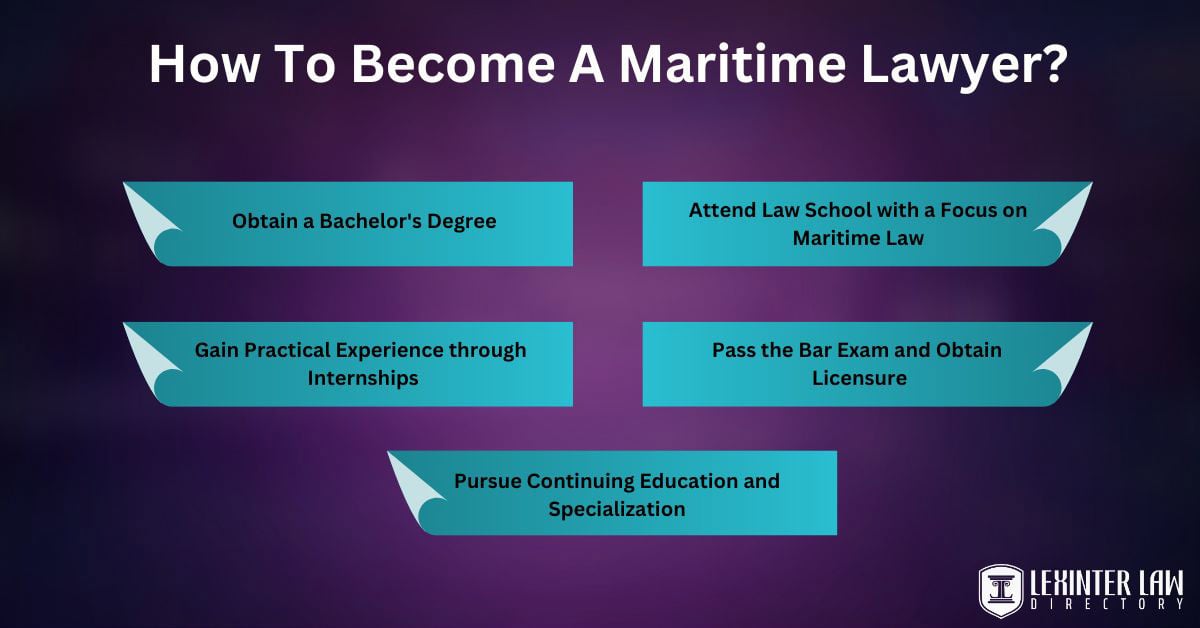7 Best Maritime Law Schools
There are seven law schools recognized as the best law schools for maritime law, each offering a robust curriculum tailored to the complexities of the specialized legal field. The institutions include Tulane University Law School, the University of Miami School of Law, the University of Texas School of Law, and the University of Pennsylvania Law School. Other institutions include Yale Law School, the University of Oregon School of Law, and the University of Maine School of Law. Tulane University Law School stands out as a leading institution with its comprehensive maritime law program, which has gained international recognition. The University of Texas School of Law has earned a reputation as one of the best law schools in the country. The institution offers students a robust curriculum that includes marine pollution and international maritime law, equipping graduates to tackle global challenges in shipping and trade. The University of Miami School of Law ranks among the top US law schools for maritime law. Students engage with real-world cases through clinics and internships while specializing in areas such as international shipping and admiralty litigation. Each of the institutions provides unique advantages for students interested in maritime law. The best law schools for Maritime law ensure that graduates are well-prepared to navigate the complexities of the global field.

The top three maritime law schools are listed below.
- Tulane University Law School: Tulane University Law School, established in 1847, offers top-tier maritime law programs. The school provides JD, LLM, and other law degrees, emphasizing maritime law specialization with certificates and externships. The 2024 acceptance rate is 48.01%, with a median LSAT score of 161 and a GPA of 3.64. Tuition stands at $71,172, totaling $95,798 annually. Tulane boasts strong experiential learning, networking opportunities, and a global alumni network, ensuring high placement rates for graduates.
- University of Miami School of Law: The University of Miami School of Law, founded in 1926, offers top maritime law programs, taking advantage of its coastal location in Coral Gables, Florida. The JD program has 18 concentrations, while the Maritime Law LL.M. requires 24 credits, focusing on admiralty and coastal law. The school ranks No. 82 nationally, with a 32.94% acceptance rate. Tuition is $62,406, bringing total costs to $98,062. Renowned faculty, practical externships, and strong networking help students succeed in maritime law careers.
- The University of Maine School of Law: The University of Maine School of Law, founded in 1962 in Portland, Maine, excels in maritime law education. The Juris Doctor program offers environmental, privacy, and business law options, while the LLM program focuses on ocean and maritime law. The 2024 acceptance rate is 58.29%, with tuition at $26,940 for residents and $40,640 for non-residents. The school emphasizes hands-on learning through the Center for Oceans and Coastal Law, preparing students for maritime legal careers.
Table of Contents
- 1. Tulane University Law School
- 2. University Of Miami School Of Law
- 3. University Of Texas School Of Law
- 4. University Of Pennsylvania Law School
- 5. Yale Law School
- 6. University Of Oregon School Of Law
- 7. University Of Maine School Of Law
- How To Choose The Best Maritime Law Program?
- What Is The Best Major For Maritime Law?
1. Tulane University Law School

Tulane University Law School is renowned as one of the top institutions for maritime law, attracting students from around the world who are interested in the specialized field. The law school’s curriculum offers unparalleled opportunities for students pursuing careers in admiralty and maritime law.
Tulane, established in 1847, is one of the oldest law schools in the United States, situated in the culturally rich city of New Orleans, Louisiana. Tulane University Law School provides diverse law degree programs for various career paths. The Juris Doctor (JD) degree, requiring six full-time semesters and 88 credit hours, offers concentrations in areas including Civil Law, Environmental Law, and Maritime Law. The Master of Laws (LLM) caters to lawyers with prior law degrees and includes programs in Admiralty and International Law. Tulane offers Doctor of Juridical Science (SJD) and Master of Jurisprudence (MJ) programs too.
Tulane University School of Law has an acceptance rate of 48.01% for the 2024 academic year, admitting about half of its applicants. The median LSAT score stands at 161, with a range from 157 to 163 for the 25th and 75th percentiles. The median GPA is 3.64, varying between 3.41 and 3.78. Tuition for the 2024-2025 academic year amounts to $71,172, and additional expenses bring the total annual cost to approximately $95,798.
Tulane University is ranked No. 78 (tie) out of 196 in Best Law Schools and is recognized as one of the best Louisiana law schools. The law school is reputed for its strong emphasis on experiential learning and legal clinics. Students benefit from diverse course offerings, including maritime law, environmental law, and international business law programs. The faculty consists of experienced legal professionals and scholars, providing students with comprehensive legal education.
Tulane University Law School provides one of the country’s most comprehensive maritime law programs, offering specialized courses for JD and LLM students. JD students earn a Maritime Law Certificate by completing 12 credit hours, including core courses such as Admiralty I and Admiralty II and electives on Collision Law, Marine Insurance, and Carriage of Goods by Sea. LLM students pursue a focused curriculum requiring 13 of 24 credits in maritime law, covering topics like maritime jurisdiction, liability, and international conventions. Externship opportunities with the U.S. Department of Labor and Center for Seafarers’ Rights offer hands-on experience. Participation in the Tulane Maritime Moot Court and Tulane Maritime Law Journal further enriches students’ practical skills. Hosting the Admiralty Law Institute and the John W. Sims Distinguished Admiralty Practitioner-in-Residence Program connects students with top maritime professionals, ensuring a robust academic and professional network.
Tulane University’s maritime law faculty is renowned for its admiralty and maritime law expertise. Professor Martin Davies directs the Maritime Law Center and holds the Admiralty Law Institute Chair. Professor Robert Force, founding director of the Maritime Law Center, has authored key maritime legal texts. Professor Günther Handl brings international law and regulatory insights to maritime studies. The faculty members provide students with exceptional knowledge of maritime law. The faculty member’s leadership enriches Tulane’s global reputation in maritime legal education.
Tulane University Law School provides clinical opportunities in maritime law for practical learning. Students gain experience through the Maritime Law Externship with the U.S. Department of Labor. The Center for Seafarers’ Rights Internship selects a student annually to work on seafarers’ legal rights. The Admiralty Moot Court Competition allows students to practice advocacy in maritime law. The hands-on opportunities enhance students’ knowledge of maritime law and prepare them for real-world legal challenges within the field.
Tulane University provides strong networking opportunities in maritime law through formal and informal events. The Maritime Law Society organizes gatherings, connecting students with professionals in admiralty law. Alumni, including Judge Barry Ashe and K. Blythe Daly, have excelled in the maritime field. The Admiralty Law Institute and John R. Brown Maritime Moot Court Competition further expand networking possibilities. Tulane’s global alumni network supports career advancement in law firms, corporations, and courts, enriching the professional experiences of students and graduates in maritime law. Tulane Law School graduates, including maritime law specialists, achieved a 91% full-time employment rate for the class of 2023. 25% of graduates joined Big Law firms, solidifying Tulane’s national standing in legal placements.
2. University Of Miami School Of Law

University of Miami School of Law stands out as one of the premier institutions for maritime law, offering specialized programs and resources that attract students globally. The law school provides hands-on training and expert-led courses in admiralty and maritime law, supported by Miami’s strategic coastal location. The school, established in 1926, is part of a vibrant urban campus in Coral Gables, Florida, a key area for international business and trade law practice. The University of Miami School of Law offers various degrees for different legal career paths. The Juris Doctor (JD) includes 18 concentrations, such as Business Law, Criminal Law, and Human Rights. Joint degrees with other university programs are available. The Master of Laws (LLM) serves U.S. and foreign-trained lawyers specializing in fields like Maritime Law and Estate Planning. The Doctor of Juridical Science (SJD) is research-focused, targeting academia and public policy roles. The Master of Legal Studies (MLS) provides legal knowledge for non-law professionals.
The University of Miami School of Law, which accepts 32.94% of applicants, ranks competitively nationwide. The school reported a total cost of attendance of $98,062, including tuition, fees, and living expenses. The 2024 tuition and fees saw a 4.77% increase, amounting to $62,406. The median GPA for admitted students is 3.72, with a median LSAT score of 162. 64% of students receive financial aid, with an average grant of $40,000, significantly lowering the total cost. The University of Miami is ranked No. 82 (tie) out of 196 in Best Law Schools and is recognized as one of the best Florida law schools. The law school is reputed for its focus on international law, tax law, and environmental law programs. Students gain practical experience through externships, legal clinics, and advocacy programs offered by the institution.
The University of Miami School of Law offers specialized programs in Maritime Law, providing comprehensive legal training in the field. The Maritime Law LL.M. program requires 24 credits, with 12 focused specifically on maritime law courses. Core courses include Admiralty Law, International Law, Coastal Law, and Law of the Sea, covering topics like maritime jurisdiction, shipping contracts, and environmental regulations. Students further enhance their knowledge by selecting elective courses such as Maritime Arbitration, Marine Insurance, and Piracy, Terrorism, and Drug Smuggling in the Maritime Domain. Other electives include the Legal Environment of the Cruise Industry, addressing specific challenges in cruise operations. Courses focusing on Climate Change Law, Marine Ecology and Law, and Natural Resources provide additional insight into environmental aspects of maritime law. Miami’s strategic location as a global maritime hub offers unique practical experiences, making the program ideal for students seeking careers in law firms, government, or international organizations involved in maritime affairs.
The Maritime Law LL.M. program at the University of Miami boasts renowned faculty in the field. Professor Bernard H. Oxman, a global expert in maritime law, has served as a judge ad hoc for the International Tribunal for the Law of the Sea and the International Court of Justice. Bernard’s work in maritime boundary disputes has shaped significant legal outcomes. Adjunct faculty and practitioners from Miami’s maritime legal community further enrich the program. Faculty expertise ensures students receive a well-rounded education in maritime law. The University of Miami School of Law provides valuable clinical opportunities for students interested in maritime law. Students engage in externships with prominent maritime firms and institutions located in Miami, gaining practical experience in admiralty law, port security, and maritime arbitration. The law school’s location near major shipping companies, including Carnival and Royal Caribbean, enhances the opportunities. Miami Law offers practicum courses and moot court competitions, such as the International Maritime Law Arbitration Moot, allowing students to handle real-world legal issues in maritime settings.
The University of Miami School of Law offers excellent networking opportunities for students interested in maritime law. The Maritime Law Society connects students with leading professionals in the field through events, talks, and networking opportunities. Miami’s status as a global maritime hub enhances access to top industry figures from companies like Carnival and Royal Caribbean. Alumni events, including Evening with Esquires, link students with influential Miami Law alumni. The global alumni network, spanning 95 countries, provides mentorship and career support for aspiring maritime law practitioners. The University of Miami School of Law has achieved strong employment outcomes, including maritime law positions. The law school has an employment rate of approximately 89.05%. Graduates from the Class of 2023 reported an average starting salary of $124,124 across various sectors.
3. University Of Texas School Of Law

University of Texas School of Law ranks among the best institutions for maritime law, providing comprehensive courses and practical opportunities in the field. Students benefit from the school’s expertise in admiralty law, enhancing their knowledge through real-world experience. The law school, established in 1883, is situated in Austin, Texas, and is one of the oldest and most respected in the region. The University of Texas School of Law offers a comprehensive range of legal programs tailored to various career paths. The Juris Doctor (J.D.) program, a three-year course, includes foundational courses, clinics, and electives for specialization. The Master of Laws (LL.M.) is a one-year advanced program for students holding a J.D. or foreign law degree, focusing on areas like Business Law and Human Rights. Dual-degree options, including J.D./M.B.A. and J.D./M.P.Aff., combine legal studies with other fields, broadening career opportunities. Concentrations allow students to specialize in environmental, health, or criminal law, providing practical expertise.
The University of Texas School of Law has a 14.9% acceptance rate for 2024, demonstrating high selectivity. Tuition is $36,429 annually for Texas residents, while non-residents pay $54,096. Additional living expenses, including housing, meals, and books, add about $24,148, making the total annual cost for non-residents approximately $78,244. Financial aid is awarded to 92% of full-time students, with an average grant of $18,000, significantly offsetting costs. University of Texas–Austin is ranked No. 16 (tie) out of 196 in Best Law Schools and is recognized as one of the best Texas law schools. The law school is reputed for its strong maritime law program and specialized legal research centers. Students benefit from hands-on training opportunities, including moot court competitions and externships.
The University of Texas School of Law offers specialized programs in maritime law, focusing on admiralty law and its practical applications. Courses include Admiralty Law, which examines federal admiralty jurisdiction, maritime worker injuries, cargo regulations, and vessel collisions. Students explore recent judicial decisions and statutes, ensuring a modern perspective on maritime law practice. A seminar on Selected Topics in Admiralty and Maritime Law delves deeper, addressing maritime torts, environmental regulations, and international disputes. The seminar includes extensive research and writing components, encouraging students to develop expertise through peer-reviewed presentations. Students interested in maritime law participate in national writing competitions, aligning their research projects with submission deadlines. The specialized programs offer a comprehensive education in theoretical and practical aspects of maritime law, preparing students for careers in the dynamic field. The courses equip students with essential knowledge and skills to succeed in maritime legal practice.
The University of Texas School of Law features notable faculty specializing in maritime law, enhancing student learning and legal expertise. Michael F. Sturley, a distinguished professor, has authored influential publications, including Admiralty and Maritime Law in the United States, and contributes extensively to legal journals. Bradley A. Jackson, an adjunct professor, brings substantial industry experience, having served as general counsel for an offshore company. Faculty expertise provides students with valuable insights into maritime law practice. The University of Texas School of Law offers opportunities for practical experience in maritime law through various programs. UT Law’s Continuing Legal Education (CLE) program hosts annual admiralty and maritime law conferences, allowing students to network with practicing attorneys and gain valuable insights. The Environmental Clinic occasionally addresses coastal and maritime environmental issues, providing relevant experience. The Transnational Worker Rights Clinic intersects with maritime labor cases. Faculty supervision, particularly from experts like Michael Sturley, enhances opportunities for specialized projects in admiralty law.
The University of Texas School of Law boasts a vast alumni network, including leaders in maritime law. The Texas Law Alumni Association connects over 25,000 graduates, offering numerous networking events and mentorship opportunities. Notable alumni, including faculty member Bradley A. Jackson, have built careers in offshore and maritime law, guiding students toward similar paths. Major firms in Houston, like Arnold & Itkin LLP, employ many graduates specializing in maritime cases. Alumni events and CLE programs focus on maritime topics, strengthening industry connections. The University of Texas School of Law reported that 96% of graduates secured positions, including maritime law roles. Graduates found full-time, long-term careers requiring Bar passage or utilizing their J.D. degrees.
4. University Of Pennsylvania Law School

The University of Pennsylvania Law School is recognized as one of the top law schools for maritime law. The institution, which began in 1850, is located in Philadelphia, Pennsylvania, and stands as one of the oldest and most prestigious law schools in the United States. The University of Pennsylvania Carey Law School provides several specialized law degrees to meet diverse professional and academic goals. The Juris Doctor (JD) program spans three years and combines core courses with interdisciplinary options and joint degrees, including opportunities at Wharton. The one-year Master of Laws (LLM) serves international lawyers seeking expertise in U.S. law. Non-law professionals benefit from the Master in Law (ML) program, enhancing their legal knowledge. The Doctor of Juridical Science (SJD) targets legal researchers pursuing academic careers.
The University of Pennsylvania Carey Law School maintains a competitive acceptance rate of 9.9% for the 2024 academic year. Admitted students generally hold a median LSAT score of 172 and a GPA of 3.92. Tuition costs for JD students amount to $76,934 annually, with estimated living expenses reaching $28,998 for students residing on campus. The figures demonstrate the considerable financial commitment involved in attending the top-tier law school. University of Pennsylvania (Carey) is ranked No. 4 (tie) out of 196 in Best Law Schools. The law school is reputed for offering an advanced maritime law program alongside global legal studies. Students engage in interdisciplinary courses, legal clinics, and international externship opportunities.
The University of Pennsylvania Carey Law School offers a diverse curriculum, allowing students to explore maritime law through international and comparative law courses. Students interested in maritime or international trade law choose from courses focusing on regulatory frameworks, cross-border legal issues, and international commercial law. The subjects intersect with maritime topics, providing valuable insight into the legal complexities of global trade and shipping. The flexible curriculum allows students to tailor their coursework by selecting relevant classes that align with their interests in maritime law. Penn Carey Law offers interdisciplinary opportunities, allowing students to collaborate with other departments like Wharton to explore economic and legal aspects of maritime commerce. The approach ensures that students interested in maritime law receive a broad education, preparing them for the challenges of the specialized legal area.
The University of Pennsylvania Carey Law School features faculty with expertise relevant to maritime law. Eric A. Feldman, an expert in international and comparative law, discusses global regulation and international frameworks applicable to maritime contexts. Faculty members offer expertise in international trade, cross-border legal issues, and regulations, benefiting students focused on maritime law. Students engage with the experts through courses and interdisciplinary opportunities, gaining knowledge applicable to maritime law.
The University of Pennsylvania Carey Law School’s Gittis Legal Clinics offers clinical opportunities that indirectly relate to maritime law. The Transnational Legal Clinic, focusing on international and cross-border legal issues, addresses cases involving trade regulation and international human rights. Students participating in the clinic gain valuable practical experience when dealing with maritime contexts. Students develop skills in international law, preparing them for further specialization in maritime and commercial law settings. The University of Pennsylvania Carey Law School has an extensive alumni network that includes professionals working in international law and regulatory fields, areas intersecting with maritime law. Alumni have served in federal judicial roles and international arbitration, dealing with maritime contexts. Networking opportunities are available through the school’s international law clinics and organizations like the Journal of International Law. The platforms enable connections between students, alumni, and experts. Engaging with the Maritime Law Association of the United States offers valuable mentorship and career-building resources. Graduates, including maritime law specialists, achieve a 98% employment rate in long-term positions.
5. Yale Law School

Yale Law School is a leading institution for maritime law, consistently recognized as one of the best for students pursuing expertise in admiralty and maritime legal studies. The school, established in 1824, is located in New Haven, Connecticut, and remains one of the most prestigious law schools worldwide. Yale Law School’s J.D. program spans three years, offering comprehensive training in law, ethics, and practice. Students choose various courses focusing on areas including corporate, constitutional, and human rights law. The LL.M. degree lasts one year for advanced legal specialization or academic preparation. The J.S.D. program requires an LL.M. and dissertation suitable for academic or policy careers. The M.S.L. offers professionals legal fundamentals in one year. The Ph.D. in Law prepares J.D. holders for advanced scholarship careers with intensive research.
Yale Law School’s 2024 acceptance rate stands at 5.58%, showcasing extreme selectivity among applicants. The 2023-2024 tuition costs $76,369, showing an increase from last year’s $73,865. Total estimated annual expenses, including living costs and books, amount to approximately $100,469. Students benefit from financial aid, with an average grant of $32,852, covering about 43% of tuition fees. Yale University is ranked No. 1 (tie) out of 196 in Best Law Schools. The law school, reputed for an elite maritime law program, combines extensive legal research opportunities.
Students participate in specialized seminars, advocacy programs, and collaborative projects with international experts.
Yale Law School offers a variety of courses under the International Law umbrella, providing students with opportunities to explore subjects that intersect with maritime law. Courses cover international trade, environmental law, and public international law, all of which relate to maritime legal practice. The extensive elective course selection provides flexibility, allowing students to tailor their studies toward specific maritime interests. Related courses, including global commerce regulation and international human rights law, provide essential knowledge applicable to maritime legal contexts. Yale’s international law centers offer further support, granting access to resources for exploring global legal opportunities, potentially including maritime careers. Clinics and workshops within international law offer practical experience, complementing theoretical courses.
Yale Law School’s notable faculty in maritime law offer expertise within international law frameworks. Peter Dutton, a Senior Research Scholar, focuses on maritime boundaries and Asia-Pacific strategic issues. Peter’s previous role directing the China Maritime Studies Institute at the U.S. Naval War College highlights his background in Chinese maritime strategy. Harold Hongju Koh, a Sterling Professor, contributes expertise in international law, intersecting with maritime law through global legal challenges. Oona Hathaway and W. Michael Reisman provide foundational insights within public international law contexts.
Yale Law School offers clinical opportunities that intersect with maritime law through related fields. The Goldman Sonnenfeldt Environmental Protection Clinic engages students in legal advocacy that involves coastal and maritime environmental issues. The Environmental Justice Law and Advocacy Clinic provides experience in international environmental law, which impacts maritime policy. Yale’s strong emphasis on international law allows students to explore maritime-related legal frameworks through clinics and externships. Relevant experience is gained in areas of environmental law and international regulation at the school.
Yale Law School’s alumni network offers substantial networking opportunities for lawyers pursuing maritime law careers. The extensive alumni community includes leaders in international and maritime legal practices, influencing global policy. Students leverage Yale’s international law resources, engaging with programs led by experts such as Harold Hongju Koh. The Paul Tsai China Center explores maritime disputes, including significant regions like the South China Sea. Yale’s online platform, The Courtyard, facilitates alumni networking, career opportunities, and global collaboration. Participation in international moot court competitions further enhances connections in maritime law fields. Yale Law School’s Class of 2023 saw 91.5% securing long-term roles, including maritime law careers. An additional 5% of graduates entered positions where having a J.D. provided a strategic advantage.
6. University Of Oregon School Of Law

University of Oregon School of Law is highly regarded for its maritime law program, standing among the top choices for students pursuing a career in the specialized field. The school, which opened in 1884, is situated in Eugene, Oregon, and is the state’s oldest law school. The institution offers a comprehensive legal education encompassing environmental law, business law, and dispute resolution. The University of Oregon School of Law offers diverse degree programs, including a three-year JD emphasizing experiential learning. The JD program allows students to focus on business, environmental, or criminal law. The LLM program provides specializations in Environmental and Natural Resources Law, Business Law, and Conflict Resolution. Concurrent degree options enable students to combine the JD with other graduate degrees efficiently. The two-year CRES master’s program trains students in mediation and negotiation for legal or international careers.
The University of Oregon School of Law’s acceptance rate for 2024 is approximately 75.23%, with 156 enrollments. Tuition costs for Oregon residents are $48,516 annually, while non-residents pay $60,414 per year. The estimated total annual cost for non-residents, including living expenses and fees, is approximately $81,582. The cost includes tuition, books, housing, and other essential student expenses. The University of Oregon is ranked No. 82 (tie) out of 196 in Best Law Schools and is recognized as one of the best Oregon law schools. The law school is reputed for its comprehensive curriculum, emphasizing environmental and maritime legal studies. Students benefit from extensive hands-on training, preparing them for careers in maritime law.
The University of Oregon School of Law offers specialized programs in maritime law through its Ocean and Coastal Law concentration. The program focuses on the intersection of marine resources, international law, and indigenous rights, forming part of the broader environmental law curriculum. Students access courses, including Ocean and Coastal Law, covering international maritime regulations and marine resource management. The Environmental Conflict Resolution course trains students in resolving disputes related to marine and environmental resource issues. International Environmental Law focuses on global regulations impacting marine environments, addressing pollution controls and biodiversity conservation. Water Resources Law explores how water law policies connect with oceanic and coastal regulations. Practical experiences are available through environmental law clinics, allowing students to engage in real cases involving marine conservation and coastal protection. The program’s combination of theoretical courses and practical application prepares students for diverse careers in maritime and environmental law fields.
The University of Oregon School of Law’s notable faculty in maritime law bring significant expertise and opportunities. Mary C. Wood, a key figure, focuses on public lands and water law, intersecting with marine conservation. Heather Brinton, Director of the ENR Law Center, leads the Oceans, Coast, and Watersheds Project, emphasizing hands-on learning in maritime policy. Greg Dotson, specializing in climate change and environmental policy, connects broader environmental issues with marine and coastal law. The faculty members provide essential knowledge for maritime law students. The University of Oregon School of Law offers clinical opportunities related to maritime law through the Environmental Law Clinic. The clinic collaborates with the Western Environmental Law Center, allowing students to work on cases involving marine ecosystem protection and coastal law issues. The Ocean, Coast, and Watersheds Project provides hands-on experience in addressing legal challenges related to ocean conservation and coastal development. Externships facilitated by the school offer students international exposure, engaging them with global maritime policies and conservation efforts.
The University of Oregon School of Law provides networking opportunities through its Environmental and Natural Resources Law Center. Alumni working in maritime and coastal law leverage the connections for career advancement and collaborations. The school’s partnerships with the Western Environmental Law Center and Ocean, Coast, and Watersheds Project enable students to gain practical experience. Notable alumni, including Judge Ann Aiken and Senator Ron Wyden, contribute to the school’s strong network, offering mentorship opportunities. The network effectively supports careers in maritime and coastal law. The University of Oregon School of Law’s 2024 graduates, including maritime law professionals, achieved an 89% employment rate. 78.1% of the graduates secured full-time, long-term legal positions requiring Bar passage or JD credentials.
7. University Of Maine School Of Law

The University of Maine School of Law is recognized as a leading institution for maritime law, offering students exceptional opportunities in admiralty and maritime legal studies. The law school, established in 1962 and located in Portland, Maine, provides access to a thriving legal community.
The University of Maine School of Law offers diverse programs tailored to various legal interests. The Juris Doctor program is a comprehensive three-year course with options in environmental, privacy, and business law. The LLM program allows U.S. and international students to specialize in fields including ocean and maritime law and environmental law, completing their studies in two semesters. Joint degrees like JD/MPH and JD/MPPM integrate law with public health or management disciplines. Certificate programs further enhance expertise in niche legal areas, including Information Privacy Law.
The University of Maine School of Law’s 2024 acceptance rate stands at 58.29%, with a 25.15% enrollment yield. Tuition fees for Maine residents are $26,940 annually, while non-residents pay $40,640 per year. The estimated total cost of attendance, including living expenses, is approximately $59,150 for non-resident students. The costs cover tuition, housing, books, and other essential expenses required for law school enrollment. The University of Oregon is ranked No. 82 (tie) out of 196 in Best Law Schools. The law school is reputed for its comprehensive curriculum, emphasizing environmental and maritime legal studies. Students benefit from extensive hands-on training, preparing them for careers in maritime law.
The University of Maine School of Law offers a specialized Certificate in Environmental and Oceans Law for JD students. The program provides courses focusing on key maritime areas, including Oceans Law & Policy, which explores the legal frameworks like the United Nations Convention on the Law of the Sea. Admiralty Law covers topics such as shipping regulations, marine insurance, and maritime security, offering students comprehensive training. Environmental Law and Policy teaches laws relevant to managing coastal and marine ecosystems, which are essential for maritime law practice. The program’s International Law course examines global treaties affecting maritime territories and oceanic resources. Students gain practical experience through externships and hands-on learning opportunities that address maritime and coastal law issues. Research and writing components require completing a paper on a relevant topic and enhancing expertise. The Center for Oceans and Coastal Law supports the specialization through partnerships and conferences, promoting maritime law education and research.
The University of Maine School of Law features prominent faculty specializing in maritime law. Professor Charles H. Norchi, a key figure, directs the Center for Oceans and Coastal Law, focusing on international maritime security and Arctic legal issues. Charles’s work encompasses maritime boundary disputes and the law of the sea, offering comprehensive expertise. Collaborations with international institutions enhance the school’s global reach and student opportunities. Faculty connections with Maine’s maritime law firms provide practical engagement for students interested in coastal legal challenges.
The University of Maine School of Law offers clinical opportunities in maritime law through the Center for Oceans and Coastal Law. Students engage directly with issues like marine security and maritime boundary disputes. Externships connect students with seasoned maritime attorneys from law firms, including Pierce Atwood and Verrill Dana, offering practical experience. The Cumberland Legal Aid Clinic provides hands-on legal training, touching on environmental and maritime law cases. Collaborations with international institutions offer exposure to global maritime legal practices, enhancing student learning.
The University of Maine School of Law provides extensive networking opportunities in maritime law. Partnerships with institutions like the United States Naval War College and the University of Nantes facilitate valuable international collaborations. Alumni, including Ivy Frignoca, Casco Baykeeper, and marine conservation advocate, offer essential connections for students. The law school’s focus on experiential learning through externships with firms such as Verrill Dana and Pierce Atwood enhances students’ professional networks in maritime law. The University of Maine School of Law, including maritime law, achieved 87.06% of graduates in full-time, long-term legal positions. Total long-term employment reached 94.12%.
How To Choose The Best Maritime Law Program?

To choose the best maritime law program, follow the five steps listed below.
- Research Academic Reputation and Accreditation. The academic reputation of a maritime law program must be thoroughly evaluated. Accreditation from recognized legal bodies ensures credibility and compliance with high educational standards. Prestigious programs offer advanced courses, respected faculty, and better opportunities for internships or job placements. Investigating student reviews and alumni success provides useful insights into the program’s quality.
- Evaluate Specialized Courses and Curriculum. Specialized courses focusing on international maritime law, shipping regulations, and marine insurance are essential. A well-rounded curriculum must cover key areas like maritime dispute resolution and environmental law. Programs with a broad range of electives and up-to-date syllabi offer more opportunities to customize learning to suit individual career goals in maritime law.
- Consider Faculty Expertise and Industry Connections. Faculty members with real-world maritime law experience and academic excellence add significant value to any program. Professors engaged in active legal practice or maritime research provide students with relevant, practical knowledge. Networking opportunities expand through programs with strong connections with the maritime industry, shipping companies, and legal firms specializing in the field.
- Examine Internship Opportunities and Practical Training. Internship placements in maritime law firms, shipping companies, or international organizations are critical for hands-on experience. Practical training opportunities allow students to apply legal theory to real-world scenarios, enhancing their skills. The best maritime law programs partner with reputable organizations to facilitate internships that give students a competitive edge in the job market.
- Assess Global Reach and Alumni Network. The global reach of a maritime law program significantly impacts future career opportunities. Programs with international affiliations, exchange programs, or collaborations with global maritime institutions increase exposure. An active alumni network in the maritime industry helps graduates build essential connections for future job placements, mentorship, and professional development in international legal markets.
What Is Maritime Law?
Maritime law governs legal matters related to the sea, including shipping and navigation. The law applies to disputes and issues involving maritime commerce, marine resources, and environmental regulations. Maritime law is guided by international treaties and conventions, such as the United Nations Convention on the Law of the Sea (UNCLOS). National laws vary, but they reflect international agreements. Maritime law differs from other areas of law as it follows its own set of international rules and conventions. Countries rely on the regulations to maintain order and fairness in global shipping and trade operations. Studying maritime law provides professionals with the expertise to navigate complex legal issues at national and international levels. Students interested in specializing in the field pursue a maritime law degree. The degree provides extensive knowledge about shipping regulations, marine insurance, and admiralty law. Maritime law addresses matters related to piracy, ship ownership, and salvage operations. Coastal nations enforce laws governing their waters, ensuring safe navigation and protection of marine resources.
The maritime law covers all legal matters related to activities on the sea and navigable waters. The law governs issues involving shipping, navigation, and marine resources. Courts apply maritime law to cases dealing with cargo disputes, shipping contracts, and injuries to seamen. The law establishes the rights and responsibilities of shipowners and maritime workers in various situations. Maritime law ensures protection for workers who suffer injuries while at sea under the Jones Act, a specific provision. The branch of law oversees environmental regulations, focusing on preventing pollution caused by shipping activities. Piracy and other criminal acts occurring on the high seas fall under maritime law’s jurisdiction. International trade relies heavily on the legal framework to ensure smooth and safe maritime operations. The legal principles applied stem from domestic legislation and international conventions. Disputes between shipowners and their clients, including contract violations, are settled under the legal system. Maritime law plays a crucial role in promoting fairness and order in the complex world of shipping and marine transportation. The unique area of law continuously evolves to address modern challenges.
What Is The Purpose Of Maritime Law?
The purpose of maritime law is to regulate activities and disputes occurring on navigable waters. The law governs issues like shipping, navigation, and commerce between nations across oceans and seas. Maritime law provides legal frameworks for contracts, insurance, and the protection of vessels. Jurisdiction extends to oceans, rivers, and large lakes used for international or commercial purposes. Maritime law ensures that rules for ship ownership, registration, and safety protocols are maintained. The branch of law plays a crucial role in managing and resolving conflicts related to marine salvage, ship collisions, and the transportation of goods. Maritime law outlines the rights and responsibilities of seafarers, protecting their employment conditions and compensation.
Maritime law works by establishing regulations governing navigation, shipping, and maritime commerce activities globally. The legal framework addresses issues like shipping contracts, cargo disputes, marine insurance, and accidents at sea. Judges and courts specialized in admiralty law handle the cases, ensuring adherence to international conventions. Enforcement agencies monitor compliance with rules like SOLAS (Safety of Life at Sea) and MARPOL (Marine Pollution), which are designed to protect vessels, crews, and marine environments. Various international organizations, including the International Maritime Organization (IMO), develop the regulations, ensuring consistency across global jurisdictions. Legal experts interpret maritime law through principles established in conventions like the United Nations Convention on the Law of the Sea (UNCLOS). Maritime law dictates ship registration processes, flag state responsibilities, and seafarers’ rights. Shipping companies, shipowners, and maritime workers must follow the regulations to create a safer, fairer, and more environmentally conscious global maritime industry.
What Is The Best Major For Maritime Law?
The best major for maritime law is political science. The major provides a strong foundation for understanding the complexities of legal systems and international relations. Political science students learn to analyze policies, governance, and regulations, which are critical when navigating maritime laws. Maritime law deals with international treaties, disputes, and commerce, all of which are influenced by political dynamics between nations. Having a deep understanding of political frameworks allows for a better interpretation of maritime legislation. Students majoring in political science develop strong research and analytical skills. Legal skills are crucial for maritime lawyers who have to dissect legal texts, maritime conventions, and case law. Political Science trains students to approach problems methodically and construct well-founded arguments. The skillset helps future maritime law professionals address complex cases, such as ship accidents, environmental regulations, and cargo claims.
A Political Science major covers international law, foreign policy, and economics. The subjects intersect with maritime law, making the field of study particularly relevant. International law courses, for example, teach the foundational rules that govern the open seas, while foreign policy courses help students understand the diplomatic aspects of maritime disputes. Economics classes focus on global trade, which is essential when considering shipping regulations, import-export policies, and maritime commerce. Political science is highly versatile, allowing students to tailor their education toward specific interests within maritime law. Students focusing on environmental policy explore marine protection laws. The versatility of the major offers a strong pathway to specializing in maritime law, ensuring students are well-prepared for the legal challenges of the maritime industry.
How To Become A Maritime Lawyer?

To become a maritime lawyer, follow the five steps listed below.
- Obtain a Bachelor’s Degree. A Bachelor’s degree is the first essential step toward becoming a maritime lawyer. Aspiring lawyers pursue undergraduate studies in political science, economics, or international relations. Focus on courses that cover maritime law foundations, international trade, or business law. Strong analytical and writing skills, as well as knowledge of legal principles, are invaluable for future law studies.
- Attend Law School with a Focus on Maritime Law. Attending an accredited law school with courses specifically related to maritime law is crucial. Students must complete foundational courses in torts, contracts, and civil procedure before specializing. Maritime law programs offer advanced coursework on topics like shipping regulations, marine insurance, and admiralty law, preparing students for the complexities of the legal field. Achieving high academic performance is necessary for professional advancement.
- Gain Practical Experience through Internships. Participating in internships or clerkships at law firms specializing in maritime law provides vital practical experience. Internships help students understand real-world applications of admiralty law and maritime litigation. Exposure to cases involving shipping accidents, environmental law, and cargo disputes builds expertise. Networking with professionals in the field enhances future job prospects and develops essential legal skills.
- Pass the Bar Exam and Obtain Licensure. Aspiring maritime lawyers must pass the Bar exam in the jurisdiction where they intend to practice. The Bar exam tests knowledge of general law principles and legal procedures. Obtaining a license allows practicing maritime law and representing clients in disputes involving shipping, seafaring, and maritime commerce. Specializing in the complex field requires additional certification, such as admiralty law certification in some regions.
- Pursue Continuing Education and Specialization. Specializing further in maritime law through continuing education or advanced certifications enhances expertise. Maritime lawyers attend conferences, seminars, and workshops focused on international shipping, marine safety, and environmental protection. Advanced certifications improve understanding of maritime regulations and international conventions. Building a strong professional reputation requires staying updated on evolving laws and standards, which is essential for anyone learning how to become a maritime lawyer.
How Long Would It Take To Study Maritime Law?
It would take at least seven years to study maritime law. The study of maritime law generally requires about seven years, which includes undergraduate and graduate education. Students must earn a Bachelor’s degree, which takes about four years. Students focus on political science, international relations, or business to build a foundation for legal studies.
The next step is enrolling in law school, which lasts three years, after completing the Bachelor’s degree. Students learn fundamental legal principles in the first year of law school, known as 1L. Aspiring lawyers focus on torts, contracts, property law, and civil procedure. The foundational areas introduce key concepts necessary for understanding more complex legal issues. 2L, the second year, allows students to choose electives that align with their interests. Students begin focusing on maritime law during the period, taking courses like admiralty law, international trade law, and maritime contracts. The year provides opportunities for internships or clerkships that expose students to practical legal work.
3L, the final year, is spent refining specialized knowledge. Students deepen their understanding of maritime law by studying specific topics like shipping regulations, marine insurance, and environmental laws related to oceans. Clinical programs are available, offering real-world experience under professional supervision. The three-year law school program concludes with preparation for the Bar exam, which is essential for legal practice. Students generally pursue Bar licensure upon graduation, followed by specialized certifications or continued education in maritime law. Completing the steps takes at least seven years, though additional certifications or degrees extend the timeline further. Mastery of maritime law, thus, involves a rigorous academic journey that culminates in a career of legal expertise in ocean-related affairs.
Is Maritime Law Difficult?
Yes, maritime law is difficult. Jurisdictional issues arise frequently as maritime law intersects with national laws and international treaties. Professionals must navigate through intricate legal frameworks that govern shipping, navigation, and ocean-based activities across multiple countries. Differing interpretations of laws between coastal and flag states create additional legal complications, which require specialized expertise. Understanding the details of maritime insurance policies, environmental regulations, and liability issues demands a comprehensive legal background. Disputes involve multiple parties from different countries, further complicating the legal proceedings and requiring cross-border cooperation. Ship owners, cargo handlers, and insurers must comply with diverse international conventions, making consistency in application difficult to achieve. Attorneys working in maritime law must stay updated on frequent changes to international treaties and national maritime regulations. Complexities arise in interpreting and enforcing maritime contracts, as they are subject to different legal systems and jurisdictions.
Maritime accidents or incidents involve lengthy investigations, leading to protracted legal battles that demand expert knowledge in law and maritime operations. Salvage rights, pollution liability, and piracy laws introduce additional layers of difficulty, necessitating specialized legal expertise in specific areas. Maritime law requires familiarity with technical knowledge related to ship operations, cargo handling, and international shipping routes. Legal professionals must collaborate with maritime experts, such as ship engineers and surveyors, to build strong cases or defenses. Maritime law demands precise attention to detail, with any misinterpretation potentially leading to severe financial and legal consequences for involved parties.
What To Expect From A Career As A Maritime Lawyer?
One expects diverse opportunities, high earning potential, and international exposure as a maritime lawyer. A career as a maritime lawyer offers diverse opportunities in areas like shipping regulations, marine insurance, environmental law, and international trade disputes. Professionals in the field expect an average salary of around $99,876 per year in the United States, although the figure varies significantly depending on factors like location, specialization, and experience level. Maritime lawyers based in coastal cities, particularly high-demand locations like San Jose, earn up to $197,194 annually. The figures highlight the impact of geographical factors and expertise on earning potential. Maritime lawyers enjoy comprehensive benefits, including healthcare packages, retirement plans, and professional development allowances. Law firms provide bonuses and performance-based incentives, enhancing compensation beyond base salaries. High-demand firms located in bustling ports or cities with significant shipping industries offer generous packages, attracting top talent. Maritime law firms cover relocation expenses and provide housing allowances, particularly for professionals working in international jurisdictions.
Career growth in the field is robust, especially for lawyers with expertise in specialized areas such as marine pollution regulations, shipping finance, or maritime arbitration. Advancing to senior positions within law firms, consulting firms, or shipping companies brings significant salary increases and additional perks like stock options or profit-sharing. Maritime lawyers with extensive experience transition into consultancy roles or establish their own practices, which is highly lucrative, especially in regions with a strong maritime industry presence. The profession allows for international exposure, offering opportunities to work with global shipping companies and organizations. Lawyers travel frequently, engaging in negotiations and legal proceedings abroad, which enrich their experience and enhance their career trajectory. The international aspect adds a dynamic element to the role, attracting professionals who enjoy diverse and challenging legal work. The maritime sector’s growth prospects, driven by global trade and evolving maritime regulations, create a stable and promising career path for maritime lawyers.
How Do Maritime Lawyers Earn?
Maritime lawyers earn by providing legal services related to shipping, international trade, and maritime worker issues. The lawyers generate income through consulting fees, litigation representation, negotiating shipping contracts, and drafting legal documents, especially for ship sales and regulatory compliance. Maritime lawyers handle cases involving cargo claims, vessel accidents, environmental regulations, and maritime worker injuries. A large portion of their earnings comes from consulting fees, representing clients in litigation, and negotiating complex shipping contracts. Maritime lawyers work with shipping companies, port authorities, insurers, or law firms that specialize in admiralty law. The lawyers generate income by drafting and reviewing legal documents related to ship sales, compliance with international laws, and offshore operations. A maritime lawyer’s expertise is critical in managing the legalities of global trade, including ensuring regulatory compliance with international shipping standards and environmental laws. The average salary for maritime lawyers in the United States is approximately $99,876 per year, but the range varies based on experience, location, and specialization. Lawyers who focus on niche areas such as salvage law, maritime finance, or environmental compliance have higher earning potential. Lawyers in prestigious law firms or holding senior positions within large shipping corporations command much higher salaries, reflecting the specialized and critical nature of their work.
Where Do Maritime Lawyers Work?
Maritime lawyers work in various specialized law firms that focus exclusively on maritime law. The firms handle cases involving shipping, international trade, and offshore energy disputes. Lawyers in maritime law firms manage shipping contracts, negotiate vessel registration terms, and ensure compliance with international maritime regulations. Shipping companies employ maritime lawyers to manage the legal aspects of their operations. Lawyers in the companies handle contracts, oversee the registration of vessels, and ensure that all maritime activities comply with international safety standards. The lawyers deal with disputes over cargo, vessel collisions, and other incidents occurring at sea. Government agencies provide another significant workplace for maritime lawyers, as they manage national and international maritime regulations. Lawyers in the setting work on policy development for shipping, fisheries management, and environmental protection related to navigable waters. Maritime lawyers represent their country in international maritime disputes, ensuring adherence to treaties and conventions.
Maritime lawyers are found in the oil and gas industry, where they handle legal matters related to offshore drilling and exploration. The lawyers ensure that companies comply with international safety and environmental regulations, addressing concerns about pollution and worker safety. Insurance companies employ maritime lawyers who specialize in assessing and managing risks related to maritime transportation. The lawyers handle claims involving cargo losses, vessel damage, and accidents at sea. Maritime lawyers work to minimize liability for their clients by ensuring proper insurance coverage and representing them in claims disputes. The versatility of maritime law allows lawyers to work in diverse locations, such as port cities, international offices, and coastal areas, depending on the focus of their expertise.
Are Maritime Lawyers Highly Paid?
Yes, maritime lawyers are highly paid. The lawyers specialize in laws governing shipping, navigation, and ocean-related commerce dealing with complex and high-stakes cases. The average annual salary for maritime lawyers is around $99,876, though experienced professionals earn significantly more based on expertise and location. Major coastal cities, particularly cities with busy ports, present higher earning opportunities due to the increased demand for maritime legal services. Lawyers practicing in San Jose, for example, earn as much as $197,194 annually, given the city’s strategic importance in maritime activities and commerce. Specialization within maritime law, such as handling admiralty cases or environmental regulations, further influences earnings, as niche expertise commands higher fees. Corporate clients, shipping companies, and international trade entities frequently seek skilled maritime lawyers, leading to lucrative engagements. Law firms specializing in maritime law pay well to retain top talent who navigate the intricacies of international maritime disputes and regulatory compliance. The high earnings reflect the complexity and specialized nature of maritime law, which requires a thorough understanding of international treaties, maritime safety protocols, and coastal regulations. Maritime law is a financially rewarding legal field, especially in prominent coastal regions with robust maritime activity.
How To Find A Good Maritime Lawyers Near Me With Lexinter?
To find a good maritime lawyer near me with Lexinter, one must use specific filters within the law directory. Lexinter offers an advanced search feature that allows users to filter attorneys by law categories. Users search based on their city, state, or region to narrow down their options. Maritime law involves specialized legal matters like shipping, navigation, and international trade. Using Lexinter’s filter, one finds lawyers who have experience handling cases related to maritime issues. Attorneys listed on Lexinter provide details about their credentials, areas of expertise, and hours of operation. Every premium attorney profile includes a direct link to the law firm’s website, making the process easier for clients to review their qualifications. The attorney profiles include contact information, enabling potential clients to set up consultations quickly. Lexinter provides access to the attorneys’ Google My Business profiles and social media, offering further insights into their reputations. Scheduling an appointment through Lexinter’s platform becomes easy once a maritime lawyer is identified. Maritime law cases require a lawyer with detailed knowledge, so it is essential to use all resources available on Lexinter to ensure the right attorney is selected.

